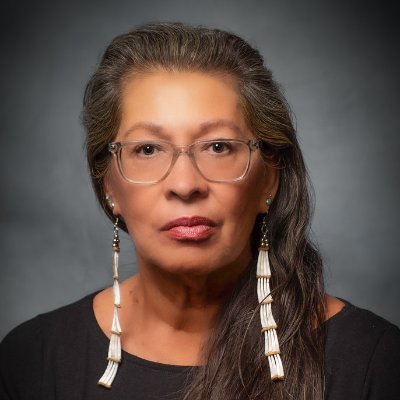Guest Opinion. In violation of Tribal sovereignty, the Trump administration is putting in place new “emergency permitting” regulations to fast-track mining and fossil fuel projects on federal lands.

Back when Deb Haaland ran the Department of the Interior (DOI), which oversees our ancestral homelands, we made historic progress. But under Trump, the DOI is getting rid of Tribal consultation, environmental reviews, and opportunities for the public to challenge dangerous polluting projects.
The DOI’s new permitting regulations “take a multi-year process down to just 28 days at most.” This new process will give Tribes that are “likely to be affected by a proposed undertaking” a maximum of only 7 days to comment after being notified -- ripping Tribal consultation and informed consent to shreds.
Consulting with Tribes and getting our input on projects that affect us is the minimum standard. Tribes are sovereign Nations that are owed true Nation-to-Nation relationships with the U.S. federal government, including co-managing federal lands and sacred places. This inherent sovereignty includes the right to make decisions about projects that may affect our communities, our territories, and our human rights.
Here at Native Organizers Alliance Action Fund, we’re growing the grassroots movement pushing the government to respect Tribal sovereignty and fulfill its obligations to Tribes. With your support, we will keep building the Indigenous political power that’s needed to ensure self-determination.
The U.S. has signed onto international law declaring that Indigenous peoples are owed Free, Prior, and Informed Consent. The federal government must get our consent before moving forward with any project that impacts us. That doesn’t mean notifying us after a decision is made; it means including Tribes in meaningful decision-making processes well before any decision is made about our lands, resources, or people.
The Trump administration is doing the opposite.
Its new “emergency permitting” regulations will shorten processes that typically take one to two years to a few weeks. When making big changes like this, presidential administrations must give time for public comment and opinions, but the Trump administration isn’t even doing that.
At the same time, they’re moving to fast-track specific projects that have been opposed by Tribes, including the Line 5 oil and gas pipeline in the Great Lakes and the copper mine that will erase sacred Oak Flat in Arizona.
The administration has also exempted corporate polluters from air standards, letting them poison our communities for profit. They’re bypassing and weakening life-saving environmental laws. And they’re trying to give corporate polluters unrestricted access to so-called public lands (which were stolen from Indigenous peoples).
Due to toxic mining and fossil fuel development on public lands, Native communities already face disproportionate environmental health impacts and violations of our human rights. But the Trump administration wants to let corporate polluters dump even more toxic waste near Native communities.
This administration is accelerating a centuries-old pattern: helping corporate polluters profit by threatening the lands we all cherish. Native peoples have continually organized and fought back, and our ancestors have overcome countless attacks and setbacks.
We walk in their footsteps today.
Judith LeBlanc (Caddo), executive director of Native Organizers Alliance Action Fund, whixh is a partner to Native Organizers Alliance.
More Stories Like This
Decisions About Us, Without Us: Education Dismantling Ignores Tribal NationsWhat the Seismic Shift in Indian Education Could Mean
Cherokee Nation Helps Make Rural Transit Possible
Humanity Is Our Greatest Common Denominator
Ken Burns Finally Puts Native People Back In the American Revolution Story — And It Matters
Help us tell the stories that could save Native languages and food traditions
At a critical moment for Indian Country, Native News Online is embarking on our most ambitious reporting project yet: "Cultivating Culture," a three-year investigation into two forces shaping Native community survival—food sovereignty and language revitalization.
The devastating impact of COVID-19 accelerated the loss of Native elders and with them, irreplaceable cultural knowledge. Yet across tribal communities, innovative leaders are fighting back, reclaiming traditional food systems and breathing new life into Native languages. These aren't just cultural preservation efforts—they're powerful pathways to community health, healing, and resilience.
Our dedicated reporting team will spend three years documenting these stories through on-the-ground reporting in 18 tribal communities, producing over 200 in-depth stories, 18 podcast episodes, and multimedia content that amplifies Indigenous voices. We'll show policymakers, funders, and allies how cultural restoration directly impacts physical and mental wellness while celebrating successful models of sovereignty and self-determination.
This isn't corporate media parachuting into Indian Country for a quick story. This is sustained, relationship-based journalism by Native reporters who understand these communities. It's "Warrior Journalism"—fearless reporting that serves the 5.5 million readers who depend on us for news that mainstream media often ignores.
We need your help right now. While we've secured partial funding, we're still $450,000 short of our three-year budget. Our immediate goal is $25,000 this month to keep this critical work moving forward—funding reporter salaries, travel to remote communities, photography, and the deep reporting these stories deserve.
Every dollar directly supports Indigenous journalists telling Indigenous stories. Whether it's $5 or $50, your contribution ensures these vital narratives of resilience, innovation, and hope don't disappear into silence.
 The stakes couldn't be higher. Native languages are being lost at an alarming rate. Food insecurity plagues many tribal communities. But solutions are emerging, and these stories need to be told.
The stakes couldn't be higher. Native languages are being lost at an alarming rate. Food insecurity plagues many tribal communities. But solutions are emerging, and these stories need to be told.
Support independent Native journalism. Fund the stories that matter.
Levi Rickert (Potawatomi), Editor & Publisher
